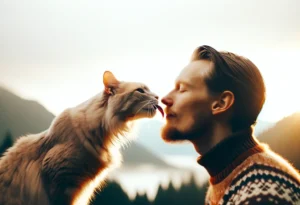Have you ever noticed your cat refusing to eat, seemingly starving themselves? It can be a worrying behavior for any cat owner. In this blog post, we will explore the reasons why some cats starve themselves and what you can do to help them.
The answer to why some cats starve themselves is not always straightforward. There are various reasons that can contribute to this behavior, including medical issues, stress, and behavioral problems. It’s important to identify the underlying cause in order to address the issue effectively.
Medical Conditions
When your furry friend starts turning up their nose at mealtime, it can be a real cause for concern. One common reason for a cat to stop eating is due to underlying medical conditions. Dental problems such as gum disease or tooth decay can make it painful for your cat to eat. Imagine trying to chow down on your favorite snack with a toothache – not fun, right? Digestive issues like constipation or inflammatory bowel disease can also put a damper on your cat’s appetite. And let’s not forget about kidney disease, a common ailment in older cats, which can lead to a decrease in appetite. It’s essential to have your feline friend checked out by a veterinarian if you suspect any of these issues are at play. Getting to the root of the problem is the first step in getting your cat back to their happy, healthy self.
Stress and Anxiety
Just like us humans, cats can also experience stress and anxiety that can impact their appetite. Changes in their environment, such as moving to a new home or the introduction of a new pet, can trigger feelings of unease in your feline friend. Tips and tricks to reduce stress in your cat’s environment include providing them with a safe space to retreat to, regular play sessions to help them burn off excess energy, and incorporating pheromone diffusers to create a calming atmosphere. Remember, a happy and relaxed cat is more likely to have a healthy appetite. If you suspect that stress is the culprit behind your cat’s decreased appetite, try implementing these strategies to help them feel more at ease.
And don’t forget, if your cat’s picky eating habits persist, it’s always best to seek advice from a veterinarian to rule out any underlying medical conditions. Always make sure to provide a well-balanced diet and a stress-free environment to keep your feline friend happy and healthy.
Behavioral Issues
If your cat is refusing to eat, it could be due to various behavioral issues. Some cats are simply picky eaters and may have specific food preferences. Try experimenting with different types of food to see what your cat enjoys. Additionally, changes in routine or environment can also impact a cat’s eating habits. Cats are creatures of habit, so disruptions like a new pet in the household or a change in living situation can lead to appetite changes. It’s essential to pay attention to your cat’s behavior and surroundings to identify any potential triggers for their decreased eating.
Environmental Factors
Environmental factors play a significant role in a cat’s eating habits. For instance, if there has been a recent addition to your household, such as a new pet, your cat may feel stressed or anxious, leading to a loss of appetite. Similarly, relocating to a new home can also cause disruption in your cat’s routine, affecting their eating patterns. Ensuring a calm and stable environment for your cat can help alleviate any stressors that may be causing them to starve themselves. Remember, cats are sensitive to changes in their surroundings, so maintaining a consistent and peaceful atmosphere is crucial for their well-being.
Additional Insight: One overlooked environmental factor that can impact a cat’s appetite is the presence of strong odors near their food or water bowls. Cats have a keen sense of smell, and if they detect something unpleasant, they may avoid eating or drinking. Make sure your cat’s feeding area is clean, odor-free, and located away from any strong scents to encourage healthy eating habits.
How to Encourage Eating
If your cat is not eating, there are several techniques you can try to encourage them to eat. Firstly, consider changing their diet by offering different types of food such as wet food, dry food, or even some cooked chicken or tuna. Cats can be picky eaters, so experimenting with various options may help spark their interest in eating.
Another strategy is to establish a routine for meal times. Cats thrive on consistency, so feeding them at the same times every day can help regulate their appetite. Additionally, try to create a calm and quiet feeding environment free from distractions, as stress or anxiety can also impact a cat’s willingness to eat.
Incorporating interactive feeding toys or puzzles can add an element of fun to meal times, making eating more appealing for your cat. These toys can stimulate their natural hunting instincts and make meal times engaging.
When to Seek Veterinary Help
If your cat continues to starve themselves despite your best efforts, it may be time to seek professional help from a veterinarian. Persistent loss of appetite could be a sign of an underlying health issue such as dental problems, digestive issues, or even more serious conditions like kidney disease or cancer.
A veterinarian will be able to conduct a thorough examination to determine the root cause of your cat’s refusal to eat. They may recommend diagnostic tests, such as blood work or imaging, to get a better understanding of your cat’s health status.
Don’t delay seeking veterinary help if you notice significant weight loss, lethargy, vomiting, or any other concerning symptoms in your cat. Early intervention is key to addressing potential health issues and ensuring your feline friend receives the appropriate care and treatment they need.
For more information on feline nutrition and health, check out this comprehensive guide from Cornell University’s Feline Health Center.
Preventing Future Issues
Help your cat avoid starving themselves by creating a stress-free environment where they feel safe and comfortable. Make sure they have a quiet place to eat without any disturbances, away from noisy areas or other pets. Providing a consistent feeding schedule can also help regulate their eating habits and prevent them from skipping meals. Additionally, ensure they have access to clean water at all times and try to avoid sudden changes in their diet to reduce stress and anxiety.
For more tips on feline nutrition and preventing feeding issues, you can check out this helpful resource from the American Association of Feline Practitioners: Feeding Your Cat: Know the Basics of Feline Nutrition.
Fun Fact: Cats’ Unique Eating Behaviors
Did you know that cats are obligate carnivores, which means they rely on a diet primarily made up of meat? This unique dietary requirement is due to their evolutionary history as hunters. Cats have taste buds specifically designed to detect amino acids found in meat, making it a crucial part of their diet. Additionally, cats prefer to eat small, frequent meals throughout the day, mimicking their hunting instincts in the wild.
By understanding your cat’s natural eating behaviors, you can better cater to their nutritional needs and create a feeding routine that aligns with their instincts.
Alex, a passionate animal lover, has experience in training and understanding animal behavior. As a proud pet parent to two dogs and three cats, he founded AnimalReport.net to share insights from animal experts and expand his knowledge of the animal kingdom.




